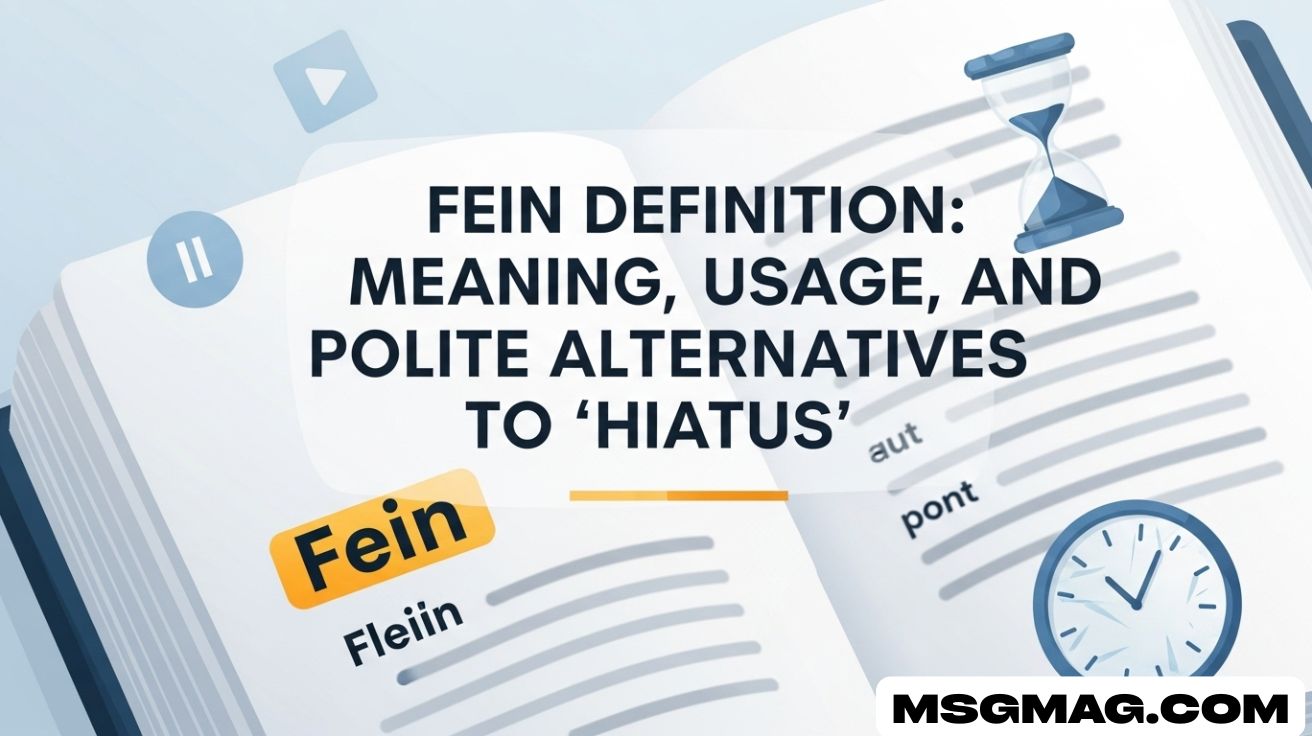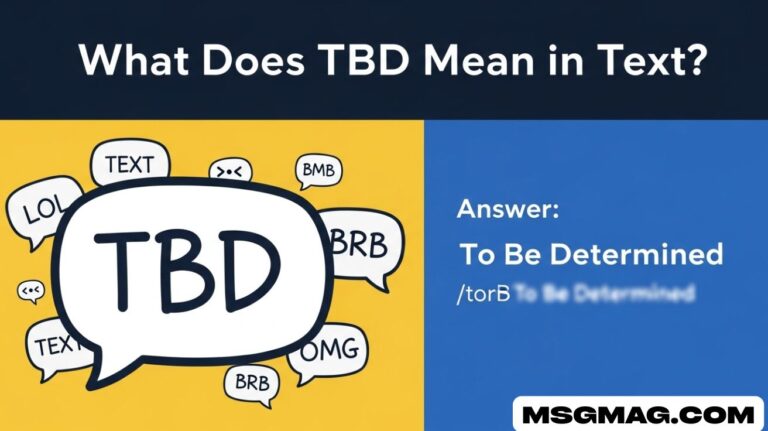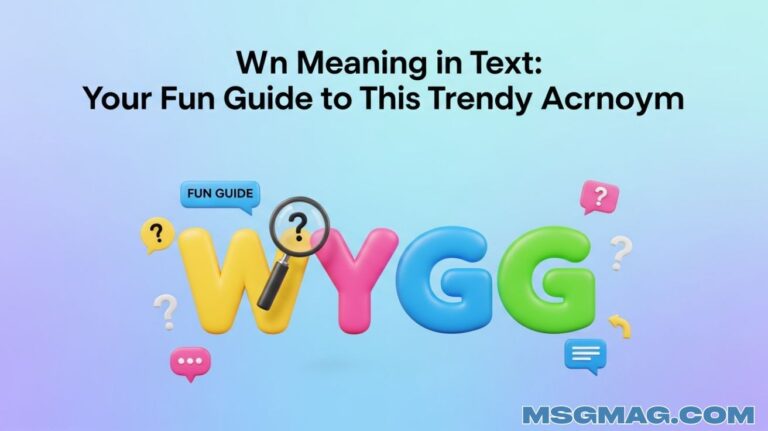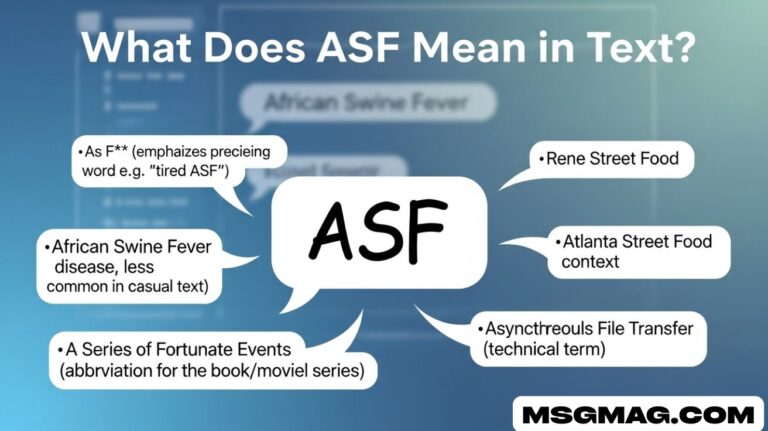Fein Definition: Meaning, Usage, and Polite Alternatives to ‘Hiatus’
The word “Fein Definition” explains the meaning of “Fein.” It shows how the term is used in different situations. It can mean a business number, slang for pretending, or even self in Irish.
Many people use “Fein” online without knowing its true meaning. It can show fake emotions or a pretend break. Understanding it helps you read messages and posts better.
“Fein Definition” is useful for both texting and professional life. It helps you know when someone is being honest or acting or fronting. Learning it improves communication and avoids miscommunication.
Fein Definition
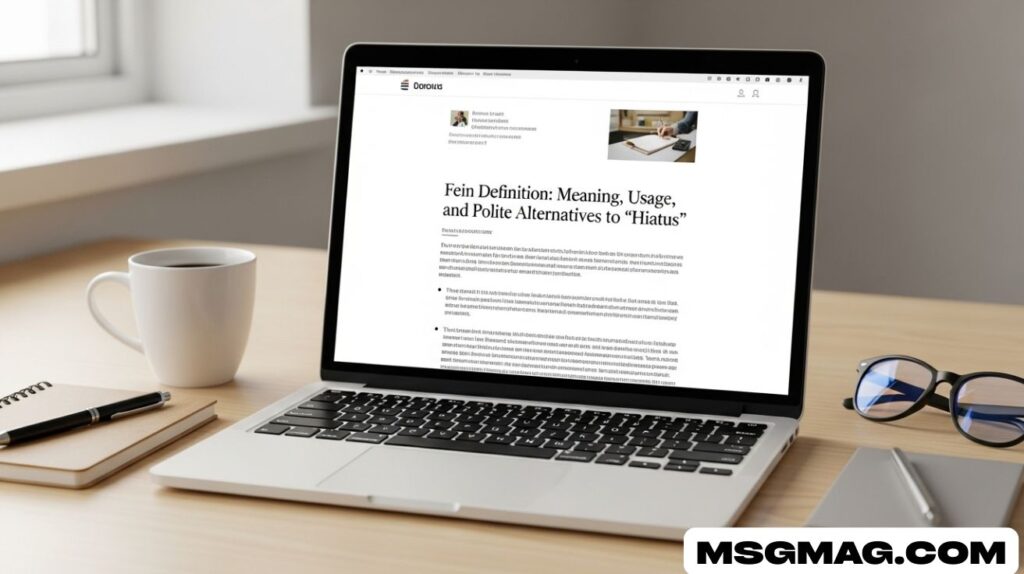
The term “Fein” has different meanings depending on how and where it is used. In a legal or business context, “FEIN IRS” refers to the Federal Employer Identification Number, a unique identifier assigned to businesses by the U.S. government for tax purposes. It works similarly to a Social Security Number, but for organizations, and ensures companies are properly registered with the IRS. In this sense, “Fein definition” is formal and precise, tied directly to compliance and financial regulations.
In contrast, in texting or casual conversation, “Fein in text” takes on a much more informal and playful meaning. Here, “Fein meaning” is often connected to “fake in slang” or “pretending meaning,” used to describe someone who is acting or fronting emotions that are not genuine. For example, someone might say, “She fein like she doesn’t care, but you can tell from her posts she really does,” illustrating “feigned emotions” and “acting or fronting” in everyday social interactions. Additionally, in Irish, “Self (Irish: féin)” adds another layer of philosophical and cultural meaning, literally translating to “self” and emphasizing personal identity.
Hiatus Meaning of Fein definition
When applied to a hiatus, “Fein hiatus meaning” often implies a pretend break rather than a genuine one. Someone might say they are taking a break from social media or work, but still remain subtly engaged. In practice, this often indicates “emotional detachment” without a true step back, or a “temporary break” that is not authentic.
For instance, a person may post, “I’m off social media for a while,” while continuing to interact behind the scenes. This type of usage highlights the subtle difference between a real pause and a “feigned break” used for appearances or social expectations.
Fein in Text: What Does It Stand For?
In digital communication, especially on platforms like TikTok, Instagram, or Snapchat, “Fein in text” often represents someone pretending, fronting, or putting on a false appearance. It is commonly associated with sarcasm, avoidance, or mock detachment. For example, someone might comment, “You fein happy for him, but your face says it all,” indicating “acting or fronting” emotions while giving the impression of support.
This form of slang, a “slang for fake,” is playful but not suitable for professional communication. Understanding this helps avoid misunderstandings and demonstrates “emotional intelligence” in reading social cues.
Tone, Context, and Why Word Choice Matters
Choosing the right words is essential, whether in casual or professional settings. When using words like “fein,” the tone can easily shift from playful to misleading. Effective communication requires “authentic communication,” which ensures clarity, avoids “miscommunication avoidance” issues, and respects emotional boundaries.
In casual conversations, using phrases that reflect true feelings improves connection and trust. Similarly, professional communication tips emphasize precision and honesty, which is why words associated with a “social media pause” or a “temporary break” are often better alternatives to “fein” when clarity is necessary.
11 Polite & Professional Alternatives to “Hiatus” (and When ‘Fein’ Applies)
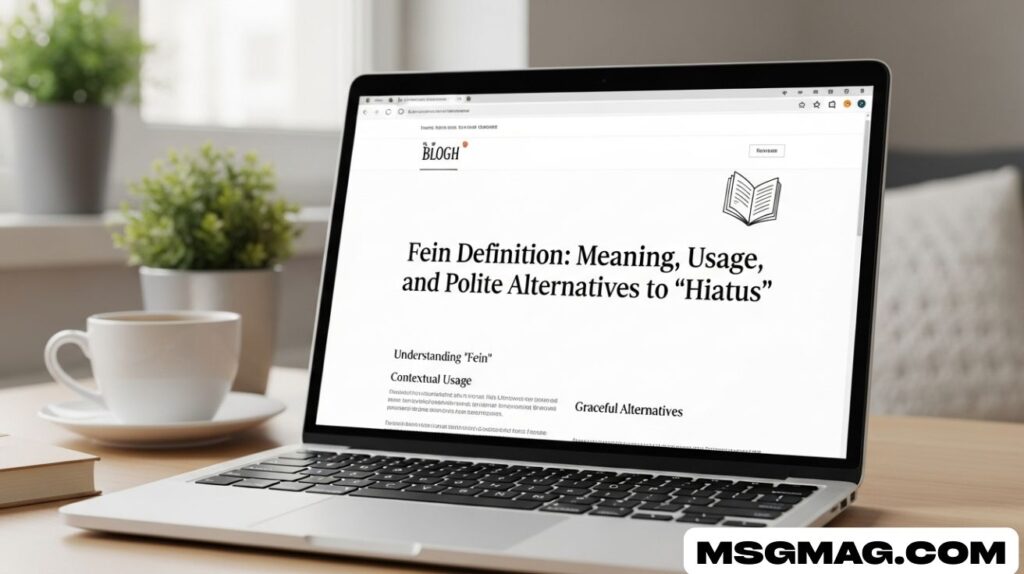
For situations where someone wants to step back without faking emotions or engagement, there are several hiatus alternatives that communicate honesty and respect. These alternatives can be used in personal, professional, or casual contexts.
1. “Taking a breather”
Saying you are “taking a breather” communicates a need for a short pause. In casual conversation, it indicates a genuine moment to rest without implying “pretending meaning” or “feigned emotions.” For example, “I’m just taking a breather from social media. I’ll be back soon.”
2. “On a temporary pause”
In professional contexts, “on a temporary pause” works well. A project or task can be put on hold without implying deception. This avoids the negative connotation associated with “fein hiatus meaning.” For instance, “Our operations are on a temporary pause while we adjust strategy.”
3. “Stepping away for clarity”
This phrase communicates introspection and self-care, avoiding any sense of “acting or fronting.” Saying, “I’m stepping away for clarity; it’s not permanent,” conveys transparency and thoughtfulness.
4. “On hold for the moment”
This is ideal for workplace communications or client updates. It is neutral and professional, steering clear of “slang for fake” or unclear intentions.
5. “Pressing pause to recharge”
Using wellness-focused language like “pressing pause to recharge” emphasizes mental health. It conveys honesty and authenticity, rather than pretending to disengage.
6. “Pausing to reflect”
This phrase highlights introspection. Whether journaling or announcing a break publicly, “pausing to reflect” promotes “emotional clarity” and genuine thoughtfulness.
7. “Taking a reflective break”
In therapeutic or counseling contexts, this communicates care for personal growth. It avoids “feigned emotions” and encourages meaningful self-awareness.
8. “Out for personal reasons”
This simple, respectful phrase works well in emails or group communication. It communicates a real absence without hinting at pretense or “acting or fronting.”
9. “Hitting pause intentionally”
Used in self-awareness or life coaching, this phrase communicates mindful disengagement. “Hitting pause intentionally” indicates control and intention rather than pretending.
10. “On a brief intermission”
This creative or social media-friendly phrasing communicates a temporary absence with charm and honesty, avoiding “pretend breaks.”
11. “Taking space to realign”
For relationships or teams, this phrase reflects reflection and clarity. Saying, “We’re taking space to realign our goals,” communicates maturity without “emotional detachment.”
When “Fein” Becomes Harmful in Communication
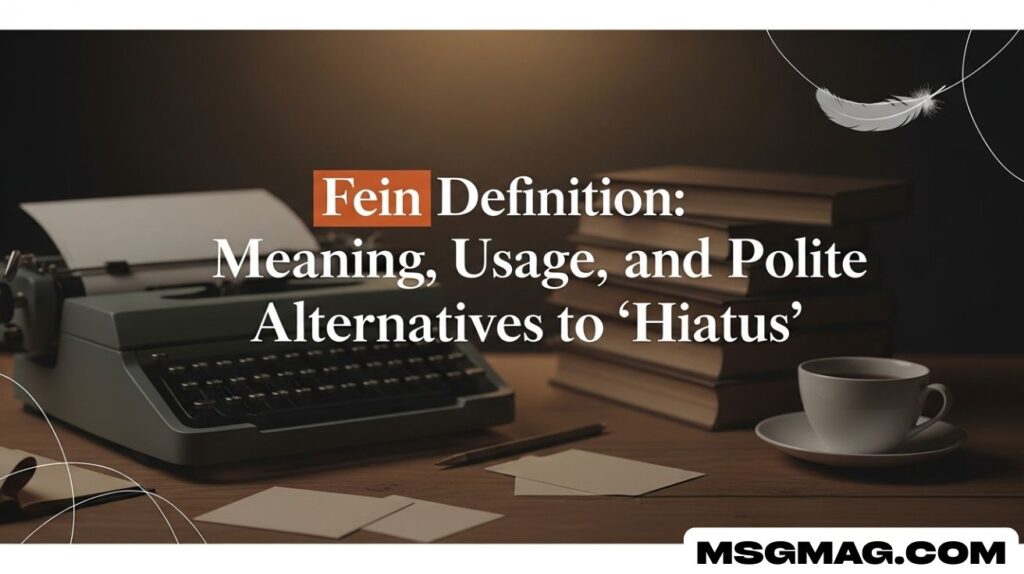
While “fein in text” can be playful, overusing it in serious contexts can be damaging. Pretending to be someone else, hiding true emotions, or feigning absence often leads to miscommunication, resentment, and “emotional exhaustion.” Over time, reliance on “acting or fronting” behaviors can erode trust in both personal and professional relationships. Using authentic language and the polite hiatus alternatives above is always more effective.
Read Also ; BFE Meaning (2025): What It Really Stands For & How to Use It
Fein definition vs. Authentic Breaks: A Comparison
Understanding the difference between “Fein definition” as a pretend break and a truly authentic pause is key. The table below summarizes these differences:
| Element | Fein | Authentic Break |
| Tone | Ironic, distant | Honest, clear |
| Intention | Pretending | Healing |
| Impact | Confusing, ambiguous | Respectful and direct |
| Usage | Slang, informal | Professional or meaningful |
This comparison highlights why choosing honesty over pretense builds trust, emotional clarity, and stronger connections.
Embracing Real Language Over Pretending
The rise of texting slang like “fein” shows a generational tendency to avoid discomfort through “pretend breaks” or “feigned emotions.” However, real growth, authentic relationships, and professional clarity come from using language that is true to intention. Whether you are taking a personal pause, stepping back professionally, or needing space in a relationship, choosing words that reflect your actual feelings improves communication, reduces misunderstanding, and demonstrates emotional intelligence.
Understanding the Many Meanings of Fein
The word “Fein” can have different meanings depending on context. In business, it refers to the FEIN IRS, or Federal Employer Identification Number, which identifies a company for tax purposes. In casual conversations, it often means pretending, fake in slang, or “acting or fronting” emotions. Recognizing the context is key to understanding its true intention.
In texting and online platforms, “Fein in text” is frequently used to describe feigned emotions or pretend breaks. It often shows someone is hiding their true feelings while appearing calm or unaffected. Knowing these differences can help prevent miscommunication, improve emotional clarity, and guide how you respond in social or professional interactions.
Fein in Texting: How It Shows Emotional Detachment
When people use “Fein” in messages, it often signals emotional detachment or avoidance. It may appear as if someone is taking a “temporary break” or stepping back from interaction, but in reality, they remain engaged behind the scenes. This kind of behavior can cause confusion or misunderstandings in casual and professional settings.
Understanding the slang helps improve authentic communication. Recognizing when someone is “pretending” or “acting or fronting” allows you to respond thoughtfully. Instead of reacting emotionally, you can interpret the intent behind the message, maintain professionalism, and avoid unnecessary conflicts in social media or work environments.
Legal and Professional Use of Fein
In the professional world, “Fein” refers to a Federal Employer Identification Number. This number, issued by the IRS, is essential for businesses to file taxes, open bank accounts, and handle payroll. Using this FEIN IRS correctly ensures compliance and avoids legal issues. It represents a formal and precise meaning, completely different from slang.
Professionals should avoid casual interpretations of “Fein” when discussing taxes or legal matters. Misusing the term in emails or official documents can create confusion. Instead, focusing on accurate terminology and clarity ensures professional credibility, miscommunication avoidance, and correct reporting within the business context.
Recognizing Fake Behavior with Fein
In everyday conversation, “Fein” often indicates someone is pretending, fronting, or showing feigned emotions. It can appear in social media posts, texts, or casual chats. For example, a friend might act like they’re happy for someone while secretly feeling upset, which shows “acting or fronting” behavior. Recognizing this helps you read social cues effectively.
Being aware of these signals allows for emotional intelligence in responses. Instead of reacting to the fake behavior, you can focus on understanding the real emotions behind it. This awareness prevents misunderstandings, promotes healthy communication, and helps maintain authentic relationships, whether online or offline.
Polite Alternatives to Using Fein for Breaks

Instead of saying someone is “fein taking a hiatus,” you can use polite alternatives like “taking a breather” or “pressing pause to recharge.” These phrases convey a genuine pause without suggesting pretending meaning or deception. They are suitable for casual conversations, social media, and personal communication.
Professional alternatives, such as “on a temporary pause” or “stepping away for clarity,” allow clear communication in workplace or client settings. Using these options ensures transparency, maintains trust, and avoids the ambiguity that “Fein hiatus meaning” can create. Choosing words wisely reflects authenticity and emotional clarity.
When Fein Becomes Harmful in Relationships
Overusing “Fein” to describe feelings or actions can harm personal and professional relationships. Pretending to feel something you don’t, or taking a “pretend break,” can cause confusion, mistrust, and emotional exhaustion. Repeated use in texting or social media may lead to misunderstandings and resentment.
To maintain healthy relationships, it’s better to focus on authentic communication. Expressing real emotions and taking genuine breaks strengthens connections and promotes mutual respect. Recognizing when “acting or fronting” is happening allows you to respond thoughtfully and avoid escalating conflicts in personal or professional environments.
FAQ,s
What is a FEIN slang?
In slang, FEIN or “fein” often means pretending, faking, or fronting emotions in casual conversation or texting.
What does the slang word feining mean?
“Feining” refers to acting or pretending something is true when it isn’t, like emotions or actions.
What is a drug FEIN?
A drug “fien” (often spelled “fiend”) describes someone with a strong addiction or craving for a substance.
What does being a fien mean?
Being a “fien” means obsessively craving something, often drugs, or showing intense desire for anything.
Conclusion
Understanding “Fein definition” helps us navigate both professional and casual communication with clarity. Whether it refers to a Federal Employer Identification Number (FEIN IRS) in business, or pretending meaning and fake in slang in texting, context is key. Misusing “Fein in text” or relying on “feigned emotions” can lead to miscommunication, emotional detachment, and confusion.
Choosing honest words and hiatus alternatives like “taking a breather” or “pressing pause to recharge” promotes authentic communication and emotional clarity. By recognizing the difference between pretend breaks and genuine pauses, we can strengthen relationships, avoid misunderstandings, and communicate with confidence in both personal and professional settings.

